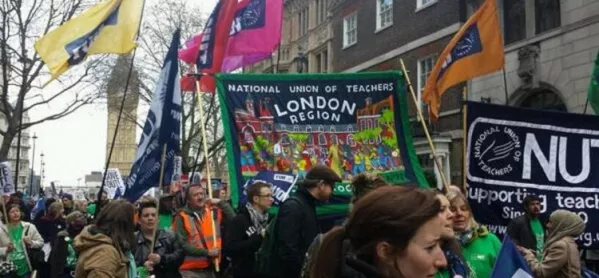- Home
- ‘Why is the Labour manifesto so lacking in red meat for the NUT?’
‘Why is the Labour manifesto so lacking in red meat for the NUT?’

Manifestos are funny things. Westminster gets mildly obsessed about them. Charities, thinktanks and unions rush to produce their own and claim “wins” for everything the parties adopt.
Political commentators pore over every dot and comma. And within parties, a huge amount of effort goes into producing them. Little-known committees spring into action, political advisers start furiously typing, and treasury teams and ministers or shadow ministers start a round of “no you can’t say that” with colleagues.
And yet I wonder how much difference they actually make to the average voter. They’re hardly bestsellers. Someone pointed out the other day that the “leaked” Labour one has been read 70,000 times. My guess is that is many multiples of the readers of yesterday’s official one.
But I am one of those special few who has read it. Well, the education section anyway. And something odd struck me.
Omissions are conspicuous by their absence
I’ve spent a fair bit of my professional life in meetings, conferences and seminars with what you could call the harder left in education. They have a few things that they get very exercised about. One is SEND, with a particular focus on inclusion (code, more or less explicitly, for fewer special schools). And sure enough, a commitment on that makes it in. Another is, unsurprisingly, funding. And again, Labour has made a commitment on this. The same for primary testing.
But you don’t have to hang around with these groups for very long before three other things inevitably come up. Abolish league tables. Scrap Ofsted. And reverse the “privatisation” of education via academies and free schools.
As a few people, including Tes‘s Ed Dorrell, have pointed out, these things are glaringly absent from yesterday’s manifesto.
Why might that be? Admittedly, the manifestos (on all sides) will have been a bit of a rush job. But as I say, reversing the “privatisation” is deep within the Corbynista education psyche. I find it deeply implausible that these things wouldn’t have been considered.
There are, therefore, two options. One is that Corbyn and McDonnell squashed these proposals. And the other option is that shadow education secretary Angela Rayner didn’t propose them in the first place.
‘Knifing them in this way is pretty cold’
The former seems unlikely in the extreme. Both the leader of the opposition and the shadow chancellor are on record as calling for these. For example, in a detailed interview with Fiona Millar in the Guardian in 2015, Corbyn said: “I am not a supporter of the principle of free schools and academies and I would want to bring them all back into the local authority orbit.” And in other sections of the manifesto, he and his shadow chancellor have not been afraid to be comparably bold/courageous/ambitious/stupid (delete according to your preference).
Which means, logically, Angela Rayner didn’t suggest these ideas for inclusion. Maybe she even spoke out against them all internally.
You have to assume that various groups lobbying her asked for commitment to these in the manifesto. These would probably include the NUT union, which is highly influential within the education section of the party and has been a strong ally of Rayner since she took the post, supporting her in various ways.
So knifing them in this way and at this time is pretty cold. It means thinking more widely than the narrow constituency of the Corbyn Labour Party and thinking about the country. Or maybe, just maybe, thinking about a post-Corbyn leadership tilt.
Actions speak louder than vocals
It also shows the importance of being formally affiliated to Labour, which the NUT isn’t. If you look at the entire Labour campaign - the manifesto, the speeches, the visits - through the prism of shoring up Corbyn and the Corbynite left, and compare and contrast this snub to the NUT with the manifesto goodies handed out to Unite and GMB, then the difference is clear.
Vocal support isn’t enough. The Labour left may come to your events. They may sign your petitions. They may appear on your conference platform and be feted by your delegates. But when the chips are down, you only really get what you want if you use your political subscriptions to pay the Labour piper.
The secret adviser works in Westminster, having spent several years working in education on both the political and non-political side, in charities and on campaigns, and has worked with ministers of all political parties
Want to keep up with the latest education news and opinion? Follow Tes on Twitter and like Tes on Facebook
Keep reading for just £1 per month
You've reached your limit of free articles this month. Subscribe for £1 per month for three months and get:
- Unlimited access to all Tes magazine content
- Exclusive subscriber-only stories
- Award-winning email newsletters
